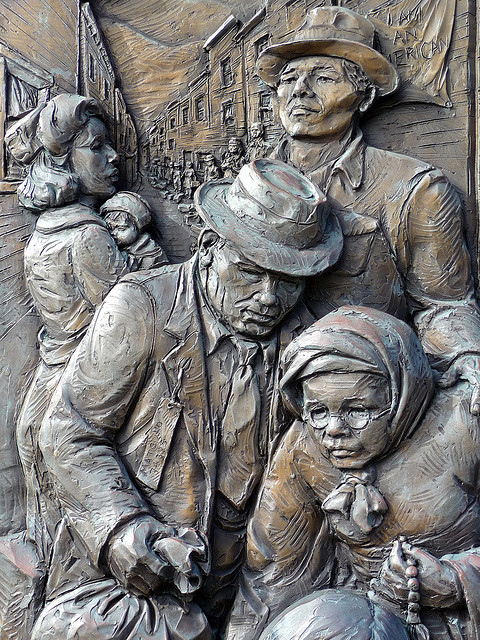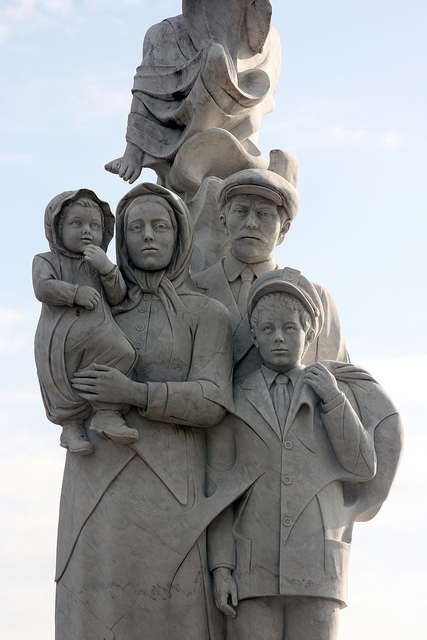|
|||||||||||||
|
What is the Real Impact of Immigration on Wages and Working Conditions? By Punkerslut
"And in the eastern states new industries were founded upon the exploitation of millions of poor immigrants, coming from countries with a low standard of living and now subjected to sweatshop labour or other most miserable working conditions."Anti-Immigrant: Immigrants worsen our economy. They come over to take jobs at much lower pay than our own people would accept, with the end result being that wage rates decline in general for all industries. If we continue to allow immigration, we are only continuing to allow the decline of our standards of living. Pro-Immigrant: This is quite some reasoning you have. You believe in economics, then, correct? Anti-Immigrant: What do you mean? Pro-Immigrant: Well, I mean that you understand concepts like supply and demand. If the supply of labor is suddenly boosted, without there being a similar boost in the demand for labor, then labor will end up getting paid less -- which means smaller paychecks for everyone who works. You understand these concepts of markets, supply, demand, production, exchange rates, and what is generally considered to be Economics, correct? Anti-Immigrant: Yes, of course. Pro-Immigrant: Most importantly, you believe in these concepts, right? Anti-Immigrant: What do you mean by "believe in"? Pro-Immigrant: You believe that an increase in supply without an increase in demand is going to cause prices to drop, just as you believe that 1 + 1 = 2, correct? I suppose what I am asking is if you believe that these ideas have a certain amount of universal application. 1 + 1 = 2, whether you're talking about apples or oranges. And likewise, an increase in supply of labor without an increase in demand is going to hurt wages, whether it's in the United States or the United Kingdom, whether it's in France or whether it's in Indonesia, right? Anti-Immigrant: Yes, the immigration problem being faced here is the same as being faced in other developed nations across the globe. Their own laboring people are suffering from those crossing their borders. Pro-Immigrant: Why don't the workers refuse to accept the lower wages? Anti-Immigrant: Because if they do, then other workers will accept them. Pro-Immigrant: Then why don't all of the workers form into an organization together, and with solidarity, they refuse to accept the lower wages? Anti-Immigrant: The workers in general wouldn't join it and capitalists wouldn't barter with an organization like that, and eventually, things would return to normal, which would lead back to a situation with immigrant labor reducing the wages for everyone. Pro-Immigrant: But, what if the workers could organize, and could unite in such a way that the bosses would have to cave in and give the laborers control over their own lives? Not only would that eliminate the temporary condition of immigrant labor reducing wages, but it would guarantee an overall, improved standard of living that the laborers wouldn't have been able to achieve otherwise, right? Anti-Immigrant: Yes, that would be true -- if it were the workers who could organize for action together instead of the Capitalists. Pro-Immigrant: So, when immigrant labor threatens wages, one can decide that there may be two causes, then, correct? Anti-Immigrant: What do you mean? Pro-Immigrant: Well, one could either say that wages decline because of the influx of labor into a market that has no change in demand for labor. Or, you could say that it's actually the present situation between the owning class and the working class that alienates the workers from their own labor. Isn't it true that both of these analyses are essentially correct? Anti-Immigrant: Yes, I suppose someone could argue either case validly. But since the second analysis runs into the impossibility of organizing the whole working people against the possessors of wealth, the first one is most fitting and valid. To say that immigration is responsible for causing low wages allows me to give the solution "just push those immigrants out," which requires no more thinking about the social situation. To say that Capitalists are responsible for low wages would require me to rethink the entire social order based on private ownership of productive property, which is a social order that we have grown accustomed to through many years of tradition. Pro-Immigrant: I know why you think immigrants come to this country: for higher wages. But do you agree with the converse, that they leave their own countries because of its low wages? Anti-Immigrant: Yes, many immigrants are leaving regions that are destitute and poverty-stricken, but our people are not responsible for that. Pro-Immigrant: Who is responsible, then? Anti-Immigrant: It is impossible to say, since there are so many regions across the globe like that. Pro-Immigrant: Isn't it true that these regions often were the homes to vibrant, thriving economies that provided a tremendous standard of living for their people? Anti-Immigrant: Yes, of course that's true, from South America to Africa. Pro-Immigrant: At what point did the peoples of different regions become impoverished and oppressed? Anti-Immigrant: It is impossible to say. Pro-Immigrant: Isn't it at the point when possessors of wealth and power showed up? Wasn't it at a point either when kings seized control over the bodies of people or when capitalists seized control over the peoples' land? Anti-Immigrant: In many cases, yes, that is true. Pro-Immigrant: Examine the two possibly valid analyses of immigration again. In the one theory, where we blame immigrants to causing wages to drop, instead of Capitalists, there is no explanation for why immigrants leave their home countries. In the other theory, where we blame a social order based on excluding people from the rights to land and work, there is a perfect explanation for why immigrants leave: because Capitalists in their home land similarly have a constrictive, powerful control over the working classes. Isn't this true? Anti-Immigrant: Yes, that is technically true. Pro-Immigrant: Why wouldn't that matter? Anti-Immigrant: Opposition to immigration is not strictly economical. It has to be cultural in many ways. The focus of the people in my country should be themselves; they shouldn't burden themselves with questions like why immigrants come to their countries. If they know that these immigrants reduce their wages, it's enough for them to rationally think that removing those immigrants will give them back their wages. It's about people in a nation taking care of other people in their own nation. Immigration undermines that sense of national culture. Pro-Immigrant: Let me go back to the situation of the two models of analysis of immigration. I'll begin by naming them: for the model where immigrants are blamed for low wages, I will give the name Nationalist Economics, and in the model where the capitalists are blamed for law wages, I will give the name Socialist Economics. The first is based on choosing nation as the most important aspect of social decision-making, whereas the second is based on choosing class as the most important aspect of social decision-making. So, these titles do seem fair, correct? Anti-Immigrant: Yes, those are fair titles for the approximation of those views. Pro-Immigrant: If you blame immigrants, who are you really blaming? You're blaming those without land, without wealth, who have children, just like you, and whose only aspiration in life is to gain the material that will give security and happiness to their otherwise impoverished families. If you blame capitalists, who are you really blaming? You're blaming those responsible for creating the miserable conditions that forced the immigrants to leave in the first place, while at the same time, benefiting from the new force of immigrants who come into a country, because they know they can exploit these poor migrants for cheap wages without any sort of mass class action in resistance. In first case, you blame the homeless, the hungry, the poor, and the miserable for wanting to escape their suffering; in the second case, you blame the rich for trying to get richer by oppressing and starving the people of the globe. Doesn't that seem fair? Anti-Immigrant: No, that's not fair at all. Those capitalists are responsible for creating our economy in the first place; they run all of the mines and factories that produce our glorious products, and they provide productive, meaningful work to the laborers. They're rich and they want to get richer, of course, everyone who believes in the nation is like that. But they don't deliberately oppress or starve anyone. Pro-Immigrant: To improve wages, you can choose to rally the people against those who speak different languages, practice different religions, and have different appearances. Or, to improve wages, you can choose to rally all of the common, working people against the very few wealthy who profit by the starvation of the masses. Anti-Immigration: All of our nation's great monuments were constructed by industrial capitalists, all of our nation's great research done at universities funded by capitalist donors, and all of our nation's great wars accomplished by armies built by capitalist factory-owners. Our nation is our great capitalists. Pro-Immigrant: Our discussion began as an argument about the situation of wages of the workers. There was a very good reason I asked you if you believed in economics. That is because now you have ceased to follow its principles. You are not deciding to support the Capitalists because it economically benefits the laboring class -- you decide to support them because you feel more comfortable rallying with those who have the same religion, language, and skin color than with those who work side-by-side with you. You have given up belief in economics entirely, and have gone to the myth of national culture, heritage, and tradition to support your anti-Immigrant views. Saying that immigrants cause wages to decline is not a statement about immigration or economics at all -- it's simply a deduction from the idea that anything different from the nation's cultural heritage is the real threat to society. In fighting those who are different, you have sacrificed the struggle for bread and land, because that would mean resisting those who are from the same nation as you. You give up the dream of a world where everyone can eat for the nightmare where everyone speaks, looks, acts, and believes the same. "You, the hundreds of thousands, aye the millions, who have no shops, no mines, no mills, no land, no home!Punkerslut,
|




